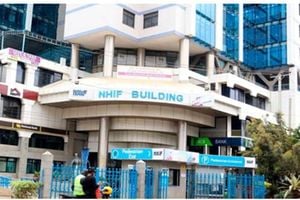
From 12.01am on Tuesday October 1, if you visit any public health facility in the country with your National Health Insurance (NHIF) card, you will be forced to register with the Social Health Authority (SHA), whether you like it or not, before being served.
The aim is to generate Sh148 billion, as projected by the Ministry of Health, which will be pooled and used to improve the country's health system in the quest for universal health coverage for all, especially those who can't afford it.
This is according to Health CS Deborah Barasa.
This means that in the event of an accident, the government is now fully prepared to evacuate you from the scene of the accident to the nearest facility with a well-equipped Accident & Emergency centre and ensure your transfer from the facility for further clinical care, a service that will also be available to all Kenyans regardless of registration or premium payment status.
The government promises this, while in the same breath admitting that road evacuation services, which may have existed in 'dreams', have been suspended for the past two years due to limited resources and unsustainable coverage.
This begs the question: what has changed in the last two years that the government will provide this life-saving service?
The rushed rollout also comes at a time when 17 counties have no psychiatrist to deal with mental health issues, denying thousands of Kenyan patients the treatment they desperately need.
The 17 counties include Tana River County, Lamu, Taita Taveta, Garissa, Marsabit, Isiolo, Nyandarua, Kirinyaga, Turkana, Samburu, Uasin Gishu, Nandi, Narok, Busia, Homa Bay, Migori and Nyamira.
Dr Chitayi Murabula, President of the Kenya Psychiatric Association, reveals that other counties have one or two psychiatrists serving a population of over 1.3 million people.
“I come from Kakamega County and we have only one psychiatrist,” he says, questioning the value for money he will get if he subscribes to SHIF.
Appearing before the Portfolio Committee on Health, chaired by Endebess MP Dr Robert Pukose, on Monday, CS Barasa explained that the government has so far managed to register just over 2 million people since July 1 this year when registration was launched.
Speaking after being summoned by the Health committee last week over a Sh104.8 billion contract between the Ministry of Health (MoH) and a Safaricom-led consortium after the Integrated Healthcare Information Technology System (IHTS) failed massively during test runs in Marsabit and Tharaka Nithi counties, CS Barasa revealed that they have so far distributed 5,000 internet-enabled data tablets in all the 47 counties to facilitate the process while private health facilities are expected to procure them.
“On October 1, 2024, we expect ground activations in 15 counties namely Kakamega, Uasin Gishu, Kisii, Tharaka Nithi, Machakos, Eldoret, Kisumu, Nyeri, Mombasa, Samburu, Trans Nzoia, Nairobi, Garissa, Elgeyo Marakwet and Embu counties, where the CECs in collaboration with county and deputy county commissioners will lead the roll out.
"Governors and CECs will also support in the digitised roll out in their counties, for example Tharaka Nithi in one Level 5 as well as Level 2 and Level 4 facilities, Nairobi at Kayole Level 4 and Kisumu in a Level 5 facility,” CS Barasa told MPs, adding that the roll out of the Social Health Authority (SHA) monitoring centre will also happen.
The health CS asked all Kenyans and persons residing in Kenya to register in order to access all benefits.
“You can register personally using your smart phone via USSD code *147# or via www.sha.go.ke and www.afyayangu.go.ke. At the moment, registration is ongoing at the former NHIF branch offices,” she added, noting that community health promoters (CHPs) are being trained to help boost subscriptions to the soon-to-be new national health insurer.
“As of 29th September this month, 2,019,588 Kenyans had registered,” she added.
According to the Kenya National Bureau of Statistics, the population projection for Kenya in mid-2024 was 52,428,290.
The World Bank estimates that by 2022, 71 percent of Kenyans will live in rural areas where access to quality healthcare can be a challenge, and compared to public healthcare services, Kenya's private facilities have consistently been rated higher on most of the health system building blocks.
However, according to the chairperson of the Health committee, Kenyans are concerned about the quality of service and value for money they will receive, given that Social Health Insurance Fund (SHIF) deductions under the new SHA, which will replace the NHIF from Tuesday, are much higher compared to what was deducted under the NHIF.
MPs are concerned that the SHA has a very ambitious target of limiting administrative costs to 5 percent of the Fund's annual expenditure when NHIF barely managed 15 percent.
But the director-general of health, Dr Patrick Amoth, says the transition is based on a study conducted by the Health ministry in 8 counties with a total sample size of 2,000 people in a country of over 52 million.
This is perhaps why Lurambi MP Bishop Titus Khamala and other members of the committee still have major concerns and say it will take a miracle for SHA to deliver universal health coverage to Kenyans.
“I want an assurance in terms of transition because we seem to be swallowing more than we can chew like we have seen in other sectors like Education with the chaos concerning the CBC programme. I want to be convinced, being the last day of September and already the payrolls have gone out there and people have been deducted money under NHIF, is everything secure?” he asked.
In response, Medical Services PS Harry Kimtai assured MPs that they are ready to roll out SHIF.
"The NHIF system will exist for the next 7 years as they will need it for reference, especially in case any legal issues arise,” he said.
This means that both NHIF and SHIF will run concurrently, but if you go to a health facility in need of NHIF services, you will be transferred to SHIF first so that all deductions will come from SHIF.
But according to CS Barasa, as NHIF—the 57-year-old insurance scheme Kenyans have been using—comes to an end, the government will deduct Sh150 - Sh1,700 for employees and Sh500 for the self-employed for the last time in October this year.
For SHA, all salaried workers will have 2.75 percent of their salary deducted as a contribution to the new health fund.
This means that those earning Sh20,000 will be deducted Sh550, while those earning Sh50,000 will pay Sh1,375 to the government scheme and those earning Sh100,000 will pay Sh2,750.
The government further explains that those earning Sh200,000 will pay Sh5,500 to the SHA, those earning Sh500,000 will contribute Sh13,750, while Kenyans earning Sh1 million and above will pay Sh27,500 to the new health insurance scheme.
This is much higher than the NHIF where Kenyans earning Sh20,000 were deducted Sh750, those earning Sh50,000 paid Sh1,200 and those earning Sh100,000 and above were deducted Sh1,700.
But how did the government arrive at what it will deduct from you under SHA?
Responding to questions from MPs, SHA Acting CEO Elijah Wachira explained that they will be using what they call a "means testing tool" that will determine the amount you will pay after using science to assess your lifestyle.
To do this, the registration form has a curated page of 17 questions they will ask you and using that information, depending on how you answer, their tool will be able to calculate within the system and tell you how much you are expected to pay annually.
For example, if the system asks what kind of TV you have in your living room and you answer that you have a 'Samsung 77 Inch S90D OLED Smart TV' which costs Sh523,999, the system will charge you more and even classify you as a very rich person and not care if the TV was given to you as a gift.
Recently, MPs put the system to the test using a poor father of four who couldn't manage a Sh300 meal a day and only owned a tiny emaciated cow he recently inherited from his late father. To the MPs' surprise, the poor household is expected to pay Sh20,000, according to the government's means testing tool.
Mr Wachira explained that they have now divided hustlers into two categories, meaning that compared to what has generally happened in the past, Kenyans will now pay according to their ability.
"We have two levels of hustlers. Level 1 is that mama mboga who runs a small business and makes money but the inflows of the money is irregular. For her, we shall use the means testing tool to establish their income cycle and how much premium they can be able to pay and after this is established then premium financing arrangements will be made so that they can be able to pay in advance and then the balance is paid to the aggregator on a monthly basis or in whatever frequency depending on how regularly their money comes through,” the CEO explained, adding that community health promoters (CHPs) will go to Kenyans in informal settlements and, using the input they have in devices the government has given them, will arrive at what is payable.
“The only one thing that is for sure is that nobody will pay less than Sh300, which means the minimum has been moved from Sh500 to Sh300.”
Level 2, according to Mr Wachira, is the hustler that does not have any income.
“You are over 18, you could be having a family, but your income status, defined by that means testing tool, says that you cannot raise money. For these hustlers, the Act has recognised them as indigent and the plan is for the government to pay the premium on their behalf and the money will come from the exchequer. Both the national and county governments will sponsor indigents.”
When asked by Nyeri Town MP Duncan Mathenge whether the current NHIF staff will be sent home when SHA is born, SHA Chairperson Abdi Mohammed said that under the transition clauses, SHA is supposed to recruit its staff competitively and priority will be given to NHIF staff.
“That process has been ongoing. We have received the approval of the human resource instruments such as PSC and now we are waiting for approvals of SRC after which the committee of the board will start recruitment immediately. But currently we will keep the same staff that NHIF has had."
However, he was at pains to explain the actual contractual agreement between the staff and SHA.
Health ministry officials promised to provide the committee with documents on the Sh104.8 billion deal with a Safaricom-led consortium as PS Kimtai, the man who signed the contract, sought time to get his documents in order.
Dr Pukose urged the Ministry of Health to rethink its approach, suggesting a gradual implementation of any new systems rather than an abrupt overhaul of the existing framework.
He also expressed frustration at the Ministry of Health's decision to sideline the NHIF IT system, which he said had effectively served the public.





